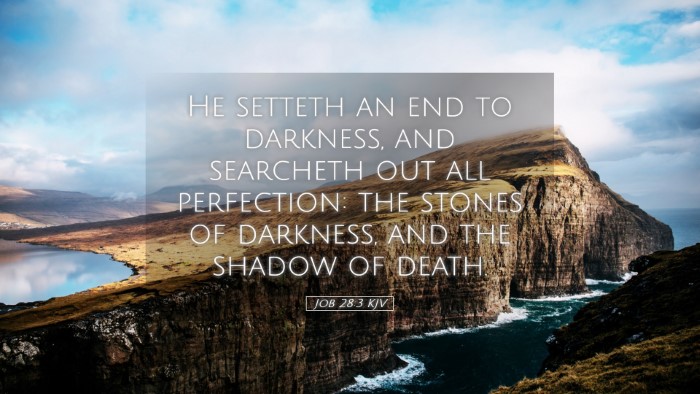Old Testament
Genesis Exodus Leviticus Numbers Deuteronomy Joshua Judges Ruth 1 Samuel 2 Samuel 1 Kings 2 Kings 1 Chronicles 2 Chronicles Ezra Nehemiah Esther Job Psalms Proverbs Ecclesiastes Song of Solomon Isaiah Jeremiah Lamentations Ezekiel Daniel Hosea Joel Amos Obadiah Jonah Micah Nahum Habakkuk Zephaniah Haggai Zechariah MalachiJob 28:3
Job 28:3 KJV
He setteth an end to darkness, and searcheth out all perfection: the stones of darkness, and the shadow of death.
Job 28:3 Bible Commentary
Commentary on Job 28:3
Job 28:3 (KJV): "He setteth an end to darkness, and searcheth out all perfection: the stones of darkness, and the shadow of death."
This verse is a profound articulation of the search for wisdom and understanding, which serves as a central theme throughout the Book of Job. The context of this verse calls attention to the contrast between human limitations and the divine insight that God possesses.
Introduction to Wisdom in Job
The discourse on wisdom begins in earnest in Job 28, which is often referred to as a hymn to wisdom. Job’s reflections delve deep into humanity’s quest for true understanding, particularly in the face of suffering and the mysteries of life.
Exegesis and Analysis
Darkness and Light
Job 28:3 introduces the concept of "darkness," symbolizing ignorance and the unknown. Darkness represents the circumstances of Job's life and the world's suffering, highlighting the fact that wisdom must be sought diligently amidst these trials.
Matthew Henry elaborates that "darkness" not only refers to ignorance but also to the depth of human depravity and moral despair. The phrase "setteth an end to darkness" indicates God's capacity to bring light and understanding where none exists
.The Search for Wisdom
Job 28:3 emphasizes the active pursuit of wisdom. Albert Barnes points out that "searcheth out all perfection" depicts an earnest effort to discover what is pure and true. This pursuit is not limited to superficial knowledge; rather, it demands a profound commitment and integrity.
Job’s assertion invites theological reflection: if God can discern the intricacies of human existence, then so must believers strive to understand their paths through faith, even when they encounter obstacles.
Life's Challenges
In the context of suffering, Adam Clarke highlights the humanity's tendency to search for answers regarding suffering and calamity. The "stones of darkness" can symbolize the hidden truths that are often obscured by life's tribulations. Clarke underscores that while humanity struggles with pain, God understands and governs the depths of our experiences with purpose.
- Suffering and Wisdom: Clarke indicates that suffering often compels individuals to seek wisdom, prompting a deeper connection to God.
- The Role of Faith: The verse serves as an encouragement for believers to maintain faith amid darkness.
- The Divine Search: God's searching for "perfection" reflects His desire for righteousness within creation.
Theological Implications
Human Understanding vs. Divine Insight
This verse carries significant theological weight, contrasting human insights with divine wisdom. The image of God "searching" underscores God's initiative in revealing knowledge. It reminds theologians that divine wisdom transcends human understanding and is integral in the struggle to comprehend the presence of suffering in the world.
Pastors can leverage this verse to admonish believers that, while their insights may fall short, God’s omniscience provides the remedy for their despair. The metaphor of "the shadow of death" evokes themes of mortality, reminding readers that God holds the final answers to life’s ultimate questions about suffering and death.
Understanding Perfection
When Job speaks of "the perfection," it invites contemplation not merely of moral or ethical perfection but encompasses the fullness of wisdom that arises from God’s creation. Barnes emphasizes that true wisdom is holistic and encompasses more than theoretical knowledge; it includes experiential understanding and application.
Practical Applications for Ministry and Study
For pastors and ministry leaders, this passage provides fertile ground for preaching about God’s sovereignty and wisdom in trials. Key applications include:
- The Importance of Seeking Wisdom: Encourage congregants to seek knowledge through scripture, prayer, and community.
- Understanding Suffering: Help members recognize that suffering doesn’t negate God’s presence; rather, it is often the crucible in which wisdom is forged.
- Fostering Trust in God: Assure them that although life's paths may be dark, God is actively involved in revealing light and understanding.
Conclusion
Job 28:3 succinctly captures the profound dynamic between human inquiry and divine revelation. As Job seeks to grapple with his suffering and the mysteries surrounding it, he ultimately points to God as the quintessential source of wisdom, illuminating life's darkness and providing insight in the depths of despair.
In merging insights from Matthew Henry, Albert Barnes, and Adam Clarke, we find a multi-faceted interpretation of this scripture that can enrich pastoral teaching, scholarly pursuits, and personal study. As believers navigate the complexities of faith, this passage remains a poignant reminder of the importance of seeking divine wisdom through life’s challenges.


